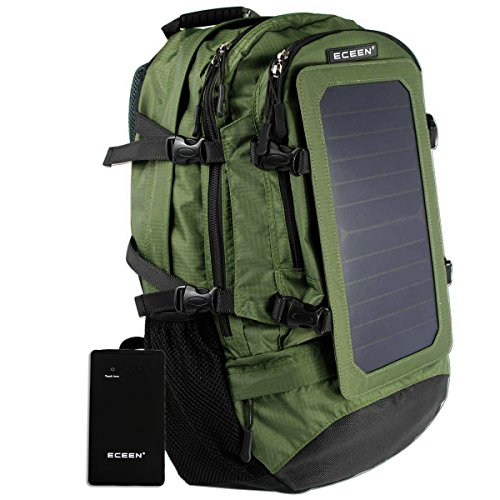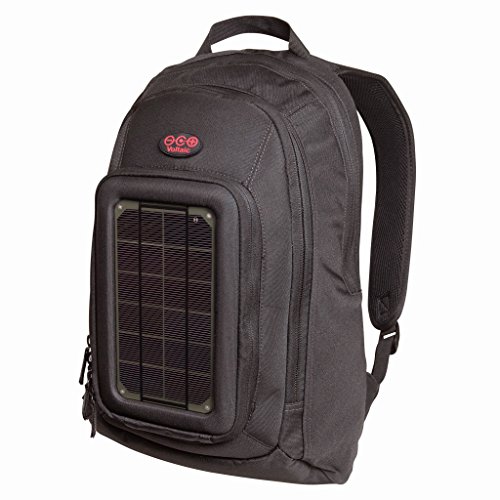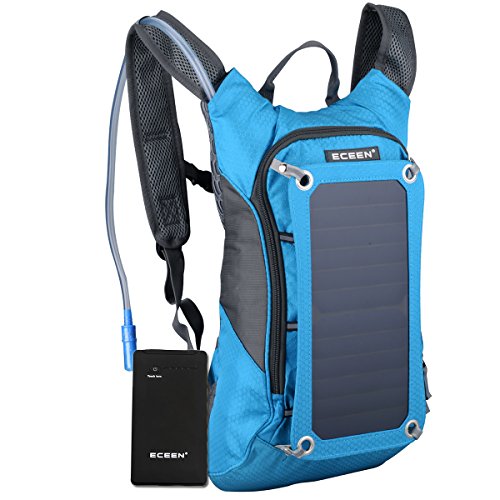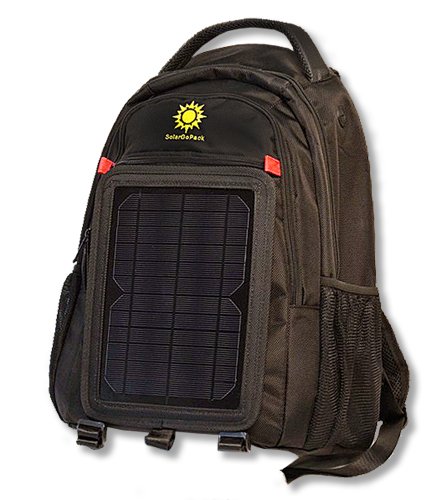Have you ever wondered how to charge your electronics while hiking? Maybe you’re a photographer or maybe you rely on your GPS device to navigate the trails. Whatever your reason, a solar backpack is the solution. But how do you know what is the best solar backpack for you?
One of our big goals here at The Adventure Junkies is to make your life easier when it comes to gear shopping. In this guide, we’ll walk you through how to choose a solar backpack and show you our selection of the best models of the year.
For a complete analysis of all hiking backpacks, check out the buyer’s guide Best Hiking Backpacks.
Quick Answer - The Solar Backpacks for Hiking
- ECEEN Solar Backpack
- Voltaic Solar Converter Daypack
- ECEEN Solar Hydration Backpack
- SolarGoPack 10k Solar Powered
Comparison Table - Best Solar Backpacks
For the best experience turn your device horizontally| Name | Power | Dimensions | Weight | Price | Rating | Review |
|---|---|---|---|---|---|---|
| ECEEN Solar Backpack | 7 W | 15.35 x 8.66 x 21.26" | 1.8 lbs | $$$ | 4.1 | Read Review |
| Voltaic Solar Converter Daypack | 3.69 W | 12 x 6 x 18" | 2.2 lbs | $$ | 4.2 | Read Review |
| ECEEN Solar Hydration Backpack | 7 W | 12.99 x 3.94 x 18.5" | 2.65 lbs | $$$ | 4.1 | Read Review |
| SolarGoPack 10k Solar Powered | 5 W | 14 x 7 x 17" | 3.0 lbs | $$ | 3.5 | Read Review |
| Name | Power | Dimensions | Weight | Price | Rating | Review |
Reviews - The Best Solar Powered Backpacks for Hiking
ECEEN Solar Backpack
Specs
- Dimensions: 15.35 x 8.66 x 21.26"
- Weight: 1.8 lbs
- Power: 7 W
- Volume: 42 Liters
- Battery: 10,000 mAH
Features
- 7W solar panels
- 5V USB port
- Micro-USB cable
- PVC fabric
- Removable panels
BEST FOR: ALL-AROUND ADVENTURERS
PROS: Ultra-lightweight, durable, large with multiple compartments, powerful solar panels and battery, ideal for multi-use
CONS: One of the most expensive solar backpacks
DEVICES: Smartphones, tablets, GPS units and laptops
Voltaic Solar Converter Daypack
Specs
- Dimensions: 12 x 6 x 18"
- Weight: 2.2 lbs
- Power: 3.69 W
- Volume: 16 Liters
- Battery: 4,000 mAH
Features
- 3.69 W solar panels,
- 6V USB port,
- Micro-USB cable
- Laptop sleeve
- Made from recycled PET Bottles
- Self-healing urethane panels
BEST FOR: ECO-FRIENDLINESS
PROS: Eco-friendly, waterproof, ideal for laptops, durable
CONS: More expensive than other models, less spacious (not suitable for long hikes), not-removable solar panels
DEVICES: Smartphones, tablets, cameras, GPS units, laptops
ECEEN Solar Hydration Backpack
Specs
- Dimensions: 12.99 x 3.94 x 18.5"
- Weight: 2.65 lbs
- Power: 7 W
- Volume: 8 Liters
- Battery: 10,000 mAH
Features
- 7W solar panels
- 1.8-liter water bladder
- PVC fabric
- 5V USB port
- Removable panels
BEST FOR: HYDRATION
PROS: Light, contains hydration pack with tube, powerful battery and solar cells, various small pockets
CONS: Expensive, not suitable for overnight hikes
DEVICES: Smartphones, tablets, MP3 players and GPS units
SolarGoPack 10k Solar Powered
Specs
- Dimensions: 14 x 7 x 17"
- Weight: 3.0 lbs
- Power: 5 W
- Volume: 27 Liters
- Battery: 10,000 mAH
Features
- Waterproof
- 5W solar cells
- Water bladder space
- Removable panels
BEST FOR: MULTI-USE
PROS: Powerful battery, waterproof, removable panels, available in multiple colors, room for water bladder, multi-use
CONS: Average solar capacity, heavier than other backpacks, unexciting design
DEVICES: Smartphones, tablets, cameras and laptops
HOW TO CHOOSE THE BEST SOLAR BACKPACKS
WEIGHT
Do you plan to go on longer hikes, including overnight treks? If so you’ll want to consider weight. Slightly heavier solar backpacks are fine for day hikes, as you will carry less gear, water and food. However, a backpack’s weight becomes a more important factor as the distance of the hike increases.
In general, always consider buying the lightest backpack in its category unless the extra weight is substituted for much more volume and/or solar power.
SIZE AND VOLUME
Again, this one applies to the long distance and multi-day hikers. The volume of your solar backpack is almost directly related to its use. A small backpack is great for commuting to and from work, using it as a carry-on bag and during short day hikes. But if you want to do some serious trekking, a bigger backpack is what you need. Having to carry plenty of food and water, maybe even camping gear, makes a bigger solar backpack a necessity.
Again, both weight and volume depend on what you will use the solar backpack for. Generally, it’s lighter yet larger for long hikes. On short hikes, it’s okay to go for smaller and even slightly heavier ones.
SOLAR POWER CAPACITY AND BATTERY POWER
The one main feature of the best solar backpacks is their solar capacity. It’s what distinguishes them from all other hiking backpacks. So, this is something to consider as well. The ideal solar capacity and battery power depend on how attached you are to your electronic devices.
Some solar backpacks provide just enough energy to keep your smartphone charged. This is perfect if you’re only using it in emergencies.
Other solar backpacks, however, have enough power to charge your smartphone, GPS unit, DSLR camera and even laptop. Those are superb options for hiking photographers. They are great if you spend significant time in the wild and need to keep your devices running.
BUDGET
Last but not least—budget. The cost is always a major factor in the decision-making process of outdoor gear. There is a significant price difference between the cheapest and the most expensive solar backpacks. This makes it necessary to weigh the pros against the cons.
A higher cost usually correlates with better quality, increased durability and, often, less weight. These factors are all worth considering. Look at a solar backpack as an investment. Money well spent will result in many more years of use.
READ MORE
For more of our top hiking & backpacking gear recommendations, check out these popular buyer's guides:
Best Backpacking Sleeping Bags
Best Backpacking Sleeping Pads





I LOVEE THE IDEA OF THIS! Since, a lot of photos when I’m out of town I usually get low battery. Especially, I’m new on hiking so I have more plans to try. Thank you for inventing this kind of bag. Worth to share!